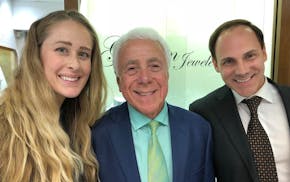Nonfiction author and soon to be novelist Neal Karlen has no plans to pen "My Weird Life with Prince."
I don't know why not. He's got the goods for that book.
But the writer who wrote a rock opera with Prince and some words that he says are in a time capsule buried at Paisley Park seriously chafes at becoming a Prince authority. He finds aging rock 'n' roll writers pathetic. So the one-time New York City resident and writer who probably knows Prince the best has resisted countless offers to write his biography. Prince's announcement that he is writing a memoir has Karlen being peppered with inquiries about whether he is writing or ghosting the project.
Big NO!
"I'm too old to sit in hotel rooms waiting for a phone call just because he can make everyone wait for three hours," said Karlen. He once waited three days for Prince, who had flown Karlen out to L.A. for a revealing interview about why he was changing his name to the unpronounceable glyph that I translated to Symbolina. "I got jaded, jaded by that Prince world. That moment where I called up and said, 'I'm going home.' … Within minutes [he called back] and you realize [celebrities] are just screwing with you. And I knew he liked me. But in that world that's how you show your power."
Old handwritten letters from Prince that you'll see in my video show they had a bond. "Please treasure our friendship as [drawing of an eyeball] do. Thanx 4 everything," reads one note from Prince while another says, "Thanx ©4 telling the truth! … Love God."
But Karlen was so desperate to sever ties that he talked up a feud with Prince during local and national radio show interviews.
More interesting to Karlen are politics and books that were labors of love such as 1999's "Slouching Toward Fargo: A Two-Year Saga of Sinners and St. Paul Saints at the Bottom of the Bush Leagues with Bill Murray, Darryl Strawberry, Dakota Sadie and Me," and 2013's Amazon national best seller "Augie's Secrets: The Minneapolis Mob and the King of the Hennepin Strip," about his grandmother's cousin.
Yet Karlen describes Prince in a way that the constantly changing cast at Paisley Park would not suggest: "He's loyal. I think he's a nicer guy than he wants people to know."
Karlen bases this on those letters and the time Prince refused to do an interview with a Rolling Stone music editor who tried to hijack Neal's interview. "How many times have you had a subject stick up for you in front of an editor?" said Karlen.
Minnesota-born Karlen answered my questions with the naked honesty of a New Yorker. The Augsburg College creative writing teacher said that when he lectures on "the literature of revenge, I have four rules: 1) They have to be public figures; 2) they have to have done something to you; 3) they have to be bullies, and 4) you have to put yourself in the story."
One of the stories into which he's putting himself is a piece of fiction based in Minneapolis's Kenwood and Lake of the Isles neighborhoods. "I'm the Jew telling the secrets with this Lake of the Isles thing," Karlen said, his eyes twinkling. "I want to expose the secrets of people in polite society who misunderstood Eleanor Mondale, who gave me her blessing to write the book before she died."
Q: How's work coming on your book?
A: It's good. What struck me was a lot of snitches came out of the woodwork. With the power of your column, with neither of us knowing it, I think, when you said, 'He's working on a story about Lake of the Isles where he's going to expose all the scandals while traveling with the antiheroine Eleanor Mondale,' and I said it was going to be thinly veiled and people in Minneapolis are going to know who it is, people freaked out and called, assuming their little scandal, I certainly must have known about it. But if [you] don't use that, let me tell you about my best friend. I would say, "I never have heard of you, but now that you have gotten a hold of me, go on." If they are the least bit threatened they'll give up their best friend. You have seen that. Eleanor would bitch and bitch and bitch about being in C.J. and it's like, 'Eleanor, I know you call C.J. all the time.' "
Q: You are such a good writer. Whom do you read?
A: I read people who you can't do what they do anymore. Tom Wolfe, A.J. Liebling, Joseph Mitchell. I love Nora Ephron. But in magazines you can't do that anymore, and in newspapers no place will let you write long. Books are what's left. When I quit Newsweek to go work for Rolling Stone, people thought I was insane. You're supposed to go the opposite way. I got my salary cut in half, my benefits cut by two-thirds but the evil Jann Wenner said, You can write 5,000-word stories instead of Newsweek by-recipe 750 words, and you can use the word [the F word] in every story. At 25 that's reason enough.
Jann Wenner was so evil, in my contract I was supposed to have an office [but] it wasn't in my contract. He just scrawled in ink, you get to scratch your name with a knife into a desk. Nowhere else would that be considered professional except at Rolling Stone. It was a world like where getting Prince interviews [caused] World World II. People think I'm this Prince insider, I've shown you these letters where he [writes], 'I love you. You understand me.' I had to actively insult him on the radio, because at 30 I gave up rock 'n' roll. I didn't want to be one of those old rock 'n' roll critics. I'd write a political book or a baseball book, something serious, religion, and I could be on C-Span and they'd ask me one question about that and then, Meanwhile, Prince …
So I had to actively insult him even though he showed me loyalty of a kind I've never seen before; everybody talks about how disloyal he is.
Q: Why did you insult him?
A: I wanted to break away from [being] The Prince guy. I wanted to be the politics guy. I called him the little purple mashugana, which is Yiddish for crazy person, on the radio. [That got] worked into Wikipedia: For his greatest hits he was going to have Neal Karlen write his liner notes but they had a huge falling out. I'm paraphrasing. It's complete baloney. I had to break away from this. I didn't want to be 50 and people say, YOU'RE THE PRINCE GUY! And it still happens. People say, You're not writing the Prince memoir? I said, "I'm too old to sit in hotel rooms waiting for a phone call just because he can make everyone wait for three hours."
Q: You know that by insulting Prince after he has shown you loyalty, Prince fans are going to think you're a schmuck?
A: To be honest, I don't know if HE realized it! I've seen him in concert a bunch since then, know people there … and I just think he's got bigger things on his mind than me! It was local radio and I feel HE thinks I repaid his loyalty, just by the contents of his letters, i.e., the first one was, "Thanks for telling the truth." I think he simply moved on, as he always does, and I moved on, as I always do — though oddly, no one seems to care about the latter!
Q: What is that thing with Prince about making people wait for him?
A: Because he can. What was his junior high? He'd walk down the hallways wearing women's bikini underwear and a raincoat. He never changed. To be a rock star is to want to make people wait, because you can. I've never written about this but I'm going to write a huge thing on my weird life with Prince, which goes way beyond Rolling Stone articles but me writing things with him and writing things buried in time capsules at Paisley Park.
Q: You wrote things in a time capsule at Paisley?
A: Yes, that he hired me to do. In fact, I made sure he paid me, which he's famous for not doing, so I had an excuse not to write about him again. I was working on a rock opera with him, the libretto. I could have made a living off him. I've had so many opportunities to write biographies of him, but I don't want to. That's why I can write all this stuff about Prince. He flew me to Los Angeles, put me up in a room, an expensive thing. He wanted to explain in his words why he was changing his name to that symbol. I had a Mercedes-Benz while I was waiting. I didn't know what it was, he wanted me to write something. Meanwhile, my then-wife was freaking out over unrelated stuff. I sat there waiting in the hotel room for three days and finally it was, "I have got get home to Minneapolis. My life is falling apart." Within five minutes I get a call that he'll pick me up. He then had a mansion in L.A., I don't know if he still does. He just played pool and explained how the old Prince was dead and this was the new person. He didn't look up once. I remember he spoke in perfect paragraphs and I realize the guy knows what he is doing. I was doing a book on Warner Bros at the time and he knew every angle of the business and the journalism business, too. I think people don't realize how smart business-wise he is. Everyone gravitates to him. I had to gravitate away or I would never be taken for anything but his Bobo, which I never was. What he liked is that I would write not nasty stuff but not we-are-not-worthy, at least it was honest [articles]."
Q: So he didn't like you sucking up to him?
A: No.
Q: Prince has not publicly, before news of the memoir, demonstrated any interest in sharing his history?
A: Yeah.
Q: So is he maturing; is that why he's writing a memoir?
A: I think he's seeing his mortality. For me, I somehow thought I was an exception until a few years ago; I woke up and realized I haven't been exempted from life's finality. So, "what are the books I need to write?" Every rock star has these huge archives, has recorded their history. the New York Times last Sunday, the cover story was Bob Dylan's archives of everything he'd ever written. His coffee grounds, whatever, have been bought [for millions] by the University of Oklahoma. And it turned out the Bruce Springsteen has huge archives, [as does] Paul McCartney. [Prince] wants to go down in musical history and he actually will. He will be remembered here in the same way August Wilson [is]; they should have built a temple for him so he'd stay. They didn't realize what they had. Joel and Ethan Coen, they should be building them temples, [too], not ripping them to shreds.
Q: I was reminded by my colleague Colin Covert, that the Coens did one movie with a black woman in a main role, Irma P. Hall, "The Ladykillers," but their movies are pretty much devoid of black people?
A: They are very conscious though. There's the famous scene in "O Brother, Where Art thou?" where they've got the Klan marching. They are aware that this is a hole in their work. I would count them on the right side, the progressive side.
Q: Do you think Prince knows when he's being a jerk?
A: No. I would say no. Unless he knew he was being a jerk at 14, which I doubt. I think he was a rock star when he was 14 in his head. What do you do when your grandest dreams come true? I don't think [Prince is] surprised that Forbes has him worth what? $90 million, $900 million?
Q: WHY CAN'T HE PAY HIS TAX BILLS THEN?
A: John D. Rockefeller used to give out dimes to children and they'd go, What a cheapie, and he said, How do you think you get to be John D. Rockefeller?
Q: What is the source of your greatest, not death-related, sadness: your divorce?
A: It was. I'm just trying to think here. That's such an interesting question. No one's ever asked me that question. That was, and I had to keep writing. It's one of those rare things where writing is very therapeutic. I wrote this thing, about 200 words, in the Village Voice thinking it wouldn't be seen in Minneapolis, where I was so angry and called her a name, and of course the Star Tribune picked it up as an op-ed. I called her the anti-Christ.
Q: Who are the five most memorable Minnesota personalities?
A: I would have to say Prince. And again, he did something so loyal. When he said he would talk to me for Rolling Stone, I was living in New York. It fell into my lap. I'd interviewed Wendy and Lisa. Wendy and Lisa said [to Prince] Maybe you should talk to this guy, he's from Minneapolis, he seems normal. I wasn't a rock critic, I hate rock critics, I was a feature writer. He decided to talk to me and he had never given an interview. I found out the music editor at Rolling Stone [1985] tried to take it from me. And Prince said No. Prince was the one who insisted on me. Six years later when I got the second [1990] Prince interview, the same thing happened. After that I wrote this rock opera with him. It was called "The Dawn." It was either never put on or put on once. I have it on a diskette. I said, "What will I get paid?" and he said Nothing. But you can use this as a credit. He's incredibly cheap. Not just cheap but won't pay. That's why when I wrote this time capsule and I got the 5 grand, I didn't know whether to cash it or …
Q: … Frame the check?
A: Yeah. And these letters he sent me after my Rolling Stone stories are my stocks and bonds. I [also] have tapes of Prince being interviewed. He stopped [letting people tape him. Of course, he's since been captured on video by Oprah, Bryant Gumbel when he was on "Today Show," Tavis Smiley …]. The Rock 'n' Roll Hall of Fame wants them.
Q: Do you keep them in some place safe?
A: Yes. I will sell that. … His signature, he doesn't sign autographs. I'm waiting for him to die, frankly, because they are worth infinitely more. His signature is worth so much more than Bob Dylan's. … The most loyal professional [smile] and I'm waiting till he dies? [to the camera ]A long life, Prince.
Q: And the question that you have not answered is, the five most memorable Minnesota personalities?
A: I would say the Coens because they made me chase them for 35 years. They kept canceling interviews with me that had been set up by other publications. I was later assigned by the Washington Post to do an article about them. They wouldn't allow me. I ended up doing an end-run around their protectors and they were really nice guys. They raised all their money for their first film "Blood Simple" in St. Louis Park. My dad's girlfriend, my dad's 91, Roz Baker, lived across the street [from Coens] and gave them a few hundred bucks and is still getting royalty check from their very first film.
Q: The question I'm trying to keep you focused on is the five most memorable Minnesotans.
A: Thomas L. Friedman, the three-time Pulitzer Prize winner, who yelled at me louder than anyone has ever yelled at me. I hate being yelled at, but I give everyone I've written a profile of one opportunity, it can be for 20 minutes, 5 minutes or 3 hours, to just yell.
Q: When did that article appear?
A: 2009 in the Washington Post. Garrison Keillor, for being one of the most loathsome people I've ever met. That was one of my saddest moments professionally. When someone I loved and thought would have been a great genius and I was 17 and going to the Science Museum and he was on three stations and then to interview him and see what a loathsome person he was. He wrote me a letter, too, a really mean letter that was sad professionally. I have never gotten a letter from someone saying, You seem like a very dishonest writer. Basically the story was how he was loved in 49 states and loathed here. New York Times, a full page Sunday. In the letter he said he didn't see the article. Yeaaaaaah. He's famous for going after Minnesota writers.
Q: Why is Garrison Keillor loathsome in your opinion?
A: I choose to try and be charitable and believe he had a personality disorder. That he can't help it. He's a terrible boss, first of all. I think he once said he counts the popcorn boxes. He is the exact opposite of his persona on the radio and I find that interesting. He's egotistical. Remember when he was coining love poems to his next wife, that Scandinavian transfer student he met in high school, and the woman, Margaret Moos, who had launched him to a national career was 15 feet away producing the show. It's like, that's not nice. He's also very jealous [of the Coen brothers]. It's also why he picked someone who is not going to top him. Yes, [Chris Thile] is an incredible talent, but it's a talent no one knows of and he's not going to be a storyteller. Also [Keillor] made a pass at a woman I went out with before we went out; I buried the lead.
Q: To revisit, we have Prince, the Coen brothers, Thomas L. Friedman, Garrison and then …
A: Bill Murray. I did this story on the Saints where I just traveled with him for two years. Bill Murray who is famous for being a jerk and I had been assigned to do a hatchet job on him. It turned out, Bill Murray is so kind. He is famous for telling famous people or agents go F yourself if he doesn't like them. Powerful people will call the powerful New York columnist and they'll write about what a jerk he is when in fact he's a great guy who will stand up for anybody. If I am lucky enough to live to write more books, I want to do a biography of him. Not an as-told-to like the Jenny McCarthy book. He won't have approval, but I think he's a genius. And he loves being here, but the Twin Cities are blowing it by not being mellow around him. He loved coming here, sitting on a folding chair [at St. Paul Saints games] to sell beer and people were cool.
They're, all men, and I wanted to include Patty Wetterling. And Eleanor I would put in there.

C.J.: Jerry O'Connell gets support from Wendy Williams for talk show




